Water and Sewer
Water is a fundamental resource both to New Jersey’s natural heritage and to its economic well-being. Water resources serve the needs of people, agriculture and industry. The regulatory system governing the use of water and wastewater not only affects our environmental health, but can also help rein in sprawl and support the smart, center-based development called for in the State Development and Redevelopment Plan.
The state of New Jersey has a complex system of laws, regulations and programs that address planning for and management of water, wastewater and stormwater. This system addresses both water quantity (supply) and water quality, and affects water infrastructure and land use decisions.
At the regional level, planning frameworks in the Highlands and Pinelands regions were established to protect those regions’ vulnerable water resources.
One of the first rules of land use is that development follows infrastructure. Where sewers are located largely dictates where development occurs. Similarly, where and how septic systems are regulated governs how larger-lot subdivisions are designed.
The New Jersey state Department of Environmental Protection administers the statewide Water Quality Management Planning (WQMP) rule, NJAC 7:15, in order to ensure water quality through a wastewater planning process and related mechanisms.
New Jersey Future has been actively engaged in researching, convening stakeholders and advising the wastewater planning process because of its impact on where and how growth occurs. Working with county planning departments and staff at the DEP Division of Coastal and Land Use Planning, we tracked progress in the adoption of updated Future Wastewater Service Area (FWSA) maps, which will likely affect where state government directs development incentives.
Other resources:
- Background information on wastewater planning from ANJEC
- DEP Water Quality Management Planning page, with links to the WQMP rule, statutes, and related items
New Jersey’s urban areas face particular water-infrastructure challenges, exacerbated by a coming deadline for establishing plans to control their sewer systems. Learn more and download our report, Ripple Effects, on our urban water infrastructure resource page.
- Water Infrastructure for Thriving Communities
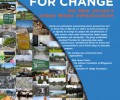
A resource page focused on initiatives to upgrade New Jersey's aging water infrastructure and reduce combined-sewer overflows.
- Stormwater Utilities
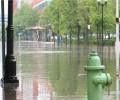
A resource page focused on stormwater utilities, an important tool available to communities to help manage stormwater-related polluted runoff and flooding.
- Mainstreaming Green Infrastructure

Mainstreaming Green Infrastructure is a program to make green infrastructure the first choice for stormwater management in New Jersey.

New Jersey Future’s Funding Navigator team has developed expertise in supporting water systems and municipal leaders in navigating the complexities of lead service line replacement (LSLR) funding, outreach, and communication. Meanwhile, the Jersey Water Works Lead Service Line Implementation Work Group and Lead-Free New Jersey address the technical and logistical aspects of LSLR. Effective communication and community outreach are critical aspects of a successful LSLR program. In this blog, we’ll highlight key strategies and best practices for communication and outreach that can improve participation rates and build customer trust.

The New Jersey Clean Water and Drinking Water State Revolving Funds (SRF) are critical financial resources that can provide a variety of funding and financing options, including principal forgiveness and low-interest loans, to support water infrastructure improvements across the state.

Municipalities face a tricky balancing act when it comes to infrastructure improvements: they need to address large, costly projects but have limited resources to fund them. Historically, issuing debt has been the primary means that municipalities are left with to finance critical improvements. However, municipal leaders are reluctant to be the ones responsible for issuing debt, while utilities and public systems are often hesitant to raise rates to cover project costs.
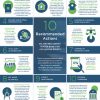
Over the next 20 years, the United States must spend $625 billion to fix, maintain, and improve water infrastructure. According to the US Environmental Protection Agency, New Jersey alone will need to spend at least $12,252,800,000 on drinking water infrastructure and $19,352,000,000 on clean water infrastructure over the next 20 years to make all necessary improvements and repairs.
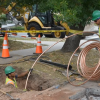
Funding, funding, funding–the chorus frequently heard at the inception of almost every community improvement project. Financing remains one of the largest obstacles to infrastructure improvements.
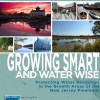
Development in the Pinelands growth areas has affected water resources and will continue to exert pressures going forward. This report highlights what can be done by municipal, regional and state agencies to minimize their negative impacts. July 2014.

This report and related case studies summarize the state of urban water infrastructure in New Jersey and how it affects residents and businesses. May 2014.

A redevelopment of a landmark downtown building; several projects designed to spur homeownership in historically disinvested areas; an urban farm; and a bold resiliency plan are the winners of New Jersey Future’s 2016 Smart Growth Awards. Al Koeppe is the recipient of the Cary Edwards Leadership Award.

A redevelopment of a historic urban park; the expansion of an anchor institution in our capital city; a “complete” redesign of a major urban street; a landmark multi-use building that serves as a community anchor; two plans to revitalize neighborhoods near transit; and a pioneering collaborative effort to improve urban neighborhoods prone to stormwater flooding are the winners of New Jersey Future’s 2015 Smart Growth Awards. Anne S. Babineau Esq. wins the Cary Edwards Leadership Award.

Three types of housing developments; two plans to revitalize fading downtowns; an industrial riverfront transformed into an urban asset; a project that will serve as an anchor of hope to its community; and a regional plan for smart economic growth are all winners of New Jersey Future’s 2014 Smart Growth Awards. Joe Maraziti Jr. Esq., receives the Cary Edwards Leadership Award.
See all New Jersey Future Blog posts and articles in this category »
Reports, Presentations and Testimony
- 12/04/2019: Statement on Stormwater Rule Changes
- 05-18-2019: Op-Ed: Lead water pipes threaten public health. Partial replacements could make it worse
- NJM May 2019 stormwater utlities Van Abs
- 04/17/2019: Comments on Proposed New C1 Stream Designations
- 03/07/2019: Testimony on S1742, S1768 and S1774
- 02/14/2019: Testimony on A2697-S1783
- 02/01/2019: Comments on Phase 1 Stormwater Rule Amendment
- 01/08/2019: Testimony on Stormwater Rule Proposal
- 10/22/2018: Testimony on Stormwater Bill A2694
- 10/11/2018: Recommendations on Proposed Energy Master Plan
- 08/03/2018: Recommendations to NJDEP Concerning CSO Public Participation Process
- New Jersey Future Water Bank Green Infrastructure Financing July 2018
- 05/10/2018: New Jersey Future Testimony on S1073
- 01/02/2018: Letter on A5339
- 11/29/2017: Year One Clean Water Agenda for the Murphy Administration
- 07/13/2017: Testimony on Drinking Water: A Crisis in Every State
- 06/08/2017: Recommendation on Water Quality Accountability Act
- Jersey Water Works Water Infrastructre Funding Report 06-2017 (Intern Report)
- 05/15/2017: Testimony on S2834 - Water Quality Accountability Act
- 03/20/2017: Testimony in support of A4569 - Water Quality Accountability Act
- New Jersey Future 2017 Gubernatorial Platform
- 02/13/2017: Testimony in support of A4415
- Lead in School Drinking Water
- 2013 Facing Our Future Report - Infrastructure Investments Necessary for Economic Success - Links to Water Infrastructure Resources
- Final Jersey City to Proacitvely Test Water Supply Press Release %282%29
- 2013 Facing Our Future Report - Infrastructure Investments Necessary for Economic Success
- Can We Depend on Our Water Infrastructure?
- 2014-11-18_Trenton Green Infrastructure Feasibility Study.compressed
- Federal Urban Waters NGO News Release_12 3 2014
- Trenton_Meeting_Summary_FINAL
- New Jersey Future Stormwater Utilities Report 9-14 (Intern Report)
- PINELANDS_WEB_8_4_14-1
- New Jersey Future Van Abs 2014 Pinelands Growth Area Water Assessment
- Agenda for Change
- Case Study: Paterson
- Case Study: Jersey City
- Case Study: Hoboken
- Case Study: Camden
- Ripple Effects
- Van Abs: Water Infrastructure in New Jersey's CSO Cities
- Statutory and Regulatory Barriers to Green Infrastructure in New Jersey 1-13 (Intern Report)
- NY Times 8-3-2012 - Mapping Future Growth
- Wastewater Planning County Fact Sheets
- Smart Growth NJ August 2011 Poll Report











